A Reflective Essay: Exploring Mindfulness of Body, Thoughts & Habits
VerifiedAdded on 2023/06/11
|8
|2057
|282
Essay
AI Summary
This reflective essay explores the practice of mindfulness, focusing on three key themes: mindfulness of the body, mindfulness of thoughts, and understanding one's mind's reactive habits. The author discusses their initial confusion about mindfulness and how practical exercises helped them connect with their body and understand its connection to the mind. They delve into the importance of intention, attention, and attitude in mindfulness, and how meditation and reflective journaling aided in managing stress and improving mental well-being. The essay further examines how reactive habits influence daily life, detailing the author's journey of breaking negative thought patterns through mindfulness techniques. Ultimately, the author concludes that mindfulness has enhanced their attention, emotional regulation, and stress management, becoming an integral part of their daily routine. Desklib offers similar resources for students seeking academic support.
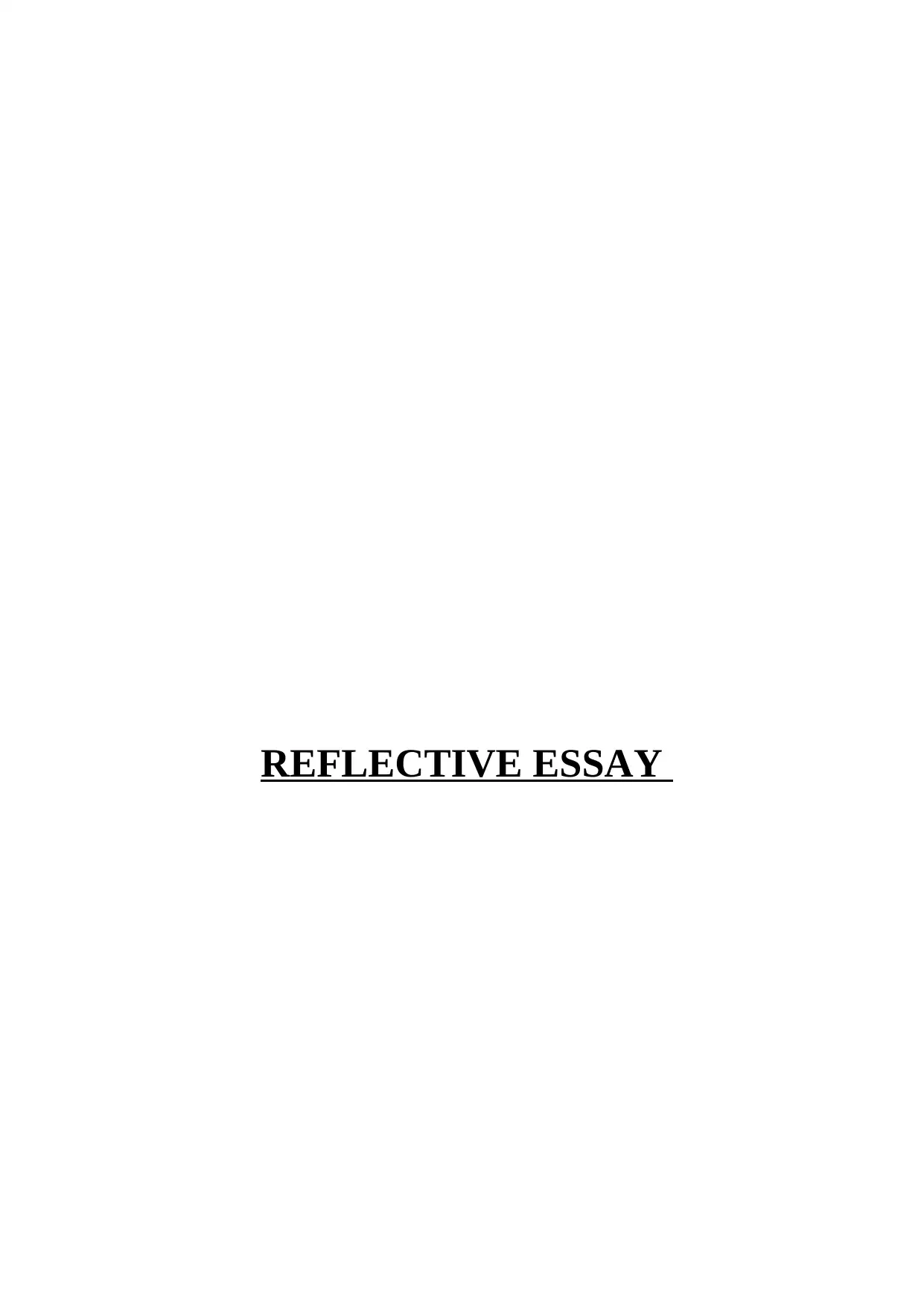
REFLECTIVE ESSAY
Paraphrase This Document
Need a fresh take? Get an instant paraphrase of this document with our AI Paraphraser
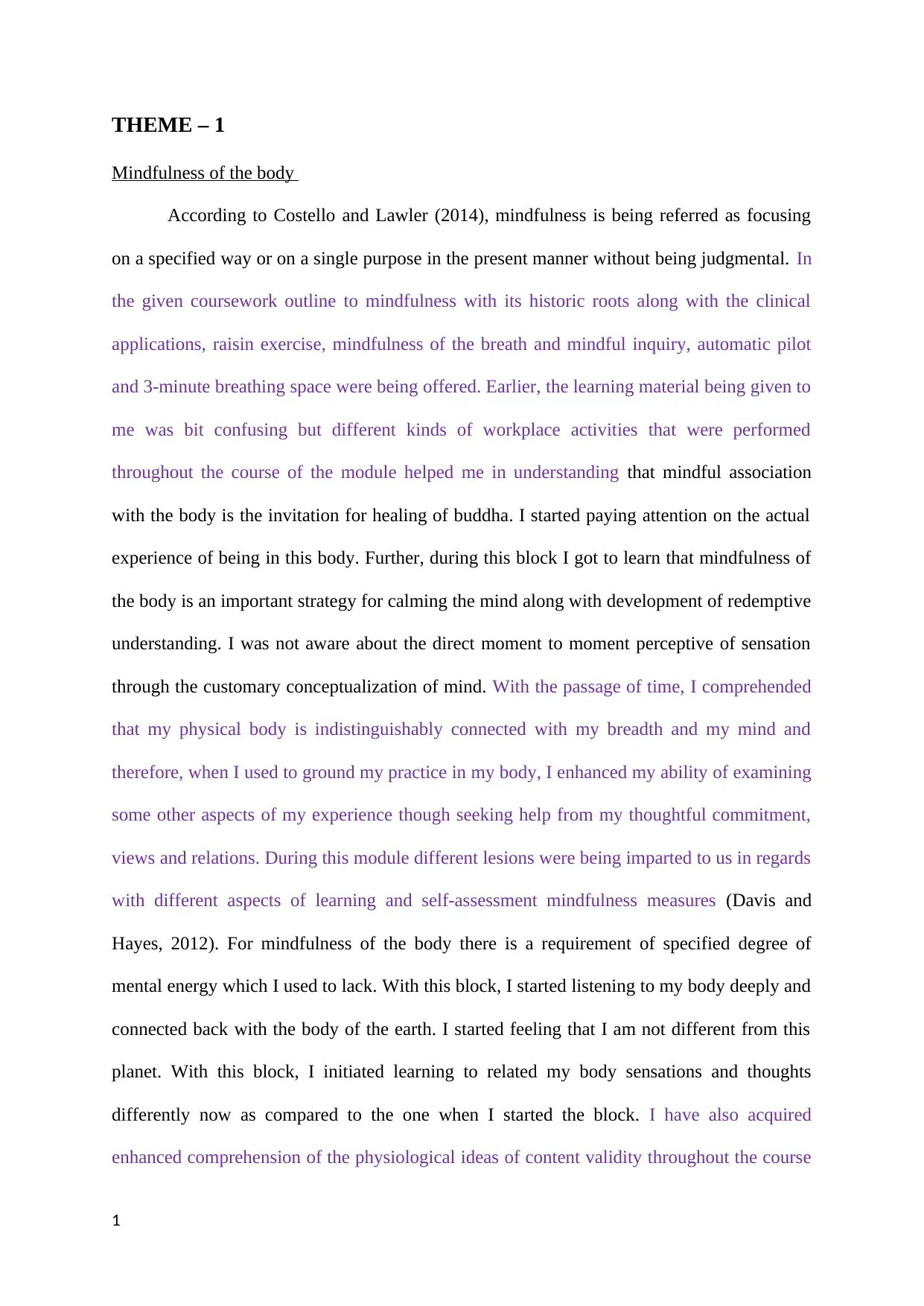
THEME – 1
Mindfulness of the body
According to Costello and Lawler (2014), mindfulness is being referred as focusing
on a specified way or on a single purpose in the present manner without being judgmental. In
the given coursework outline to mindfulness with its historic roots along with the clinical
applications, raisin exercise, mindfulness of the breath and mindful inquiry, automatic pilot
and 3-minute breathing space were being offered. Earlier, the learning material being given to
me was bit confusing but different kinds of workplace activities that were performed
throughout the course of the module helped me in understanding that mindful association
with the body is the invitation for healing of buddha. I started paying attention on the actual
experience of being in this body. Further, during this block I got to learn that mindfulness of
the body is an important strategy for calming the mind along with development of redemptive
understanding. I was not aware about the direct moment to moment perceptive of sensation
through the customary conceptualization of mind. With the passage of time, I comprehended
that my physical body is indistinguishably connected with my breadth and my mind and
therefore, when I used to ground my practice in my body, I enhanced my ability of examining
some other aspects of my experience though seeking help from my thoughtful commitment,
views and relations. During this module different lesions were being imparted to us in regards
with different aspects of learning and self-assessment mindfulness measures (Davis and
Hayes, 2012). For mindfulness of the body there is a requirement of specified degree of
mental energy which I used to lack. With this block, I started listening to my body deeply and
connected back with the body of the earth. I started feeling that I am not different from this
planet. With this block, I initiated learning to related my body sensations and thoughts
differently now as compared to the one when I started the block. I have also acquired
enhanced comprehension of the physiological ideas of content validity throughout the course
1
Mindfulness of the body
According to Costello and Lawler (2014), mindfulness is being referred as focusing
on a specified way or on a single purpose in the present manner without being judgmental. In
the given coursework outline to mindfulness with its historic roots along with the clinical
applications, raisin exercise, mindfulness of the breath and mindful inquiry, automatic pilot
and 3-minute breathing space were being offered. Earlier, the learning material being given to
me was bit confusing but different kinds of workplace activities that were performed
throughout the course of the module helped me in understanding that mindful association
with the body is the invitation for healing of buddha. I started paying attention on the actual
experience of being in this body. Further, during this block I got to learn that mindfulness of
the body is an important strategy for calming the mind along with development of redemptive
understanding. I was not aware about the direct moment to moment perceptive of sensation
through the customary conceptualization of mind. With the passage of time, I comprehended
that my physical body is indistinguishably connected with my breadth and my mind and
therefore, when I used to ground my practice in my body, I enhanced my ability of examining
some other aspects of my experience though seeking help from my thoughtful commitment,
views and relations. During this module different lesions were being imparted to us in regards
with different aspects of learning and self-assessment mindfulness measures (Davis and
Hayes, 2012). For mindfulness of the body there is a requirement of specified degree of
mental energy which I used to lack. With this block, I started listening to my body deeply and
connected back with the body of the earth. I started feeling that I am not different from this
planet. With this block, I initiated learning to related my body sensations and thoughts
differently now as compared to the one when I started the block. I have also acquired
enhanced comprehension of the physiological ideas of content validity throughout the course
1
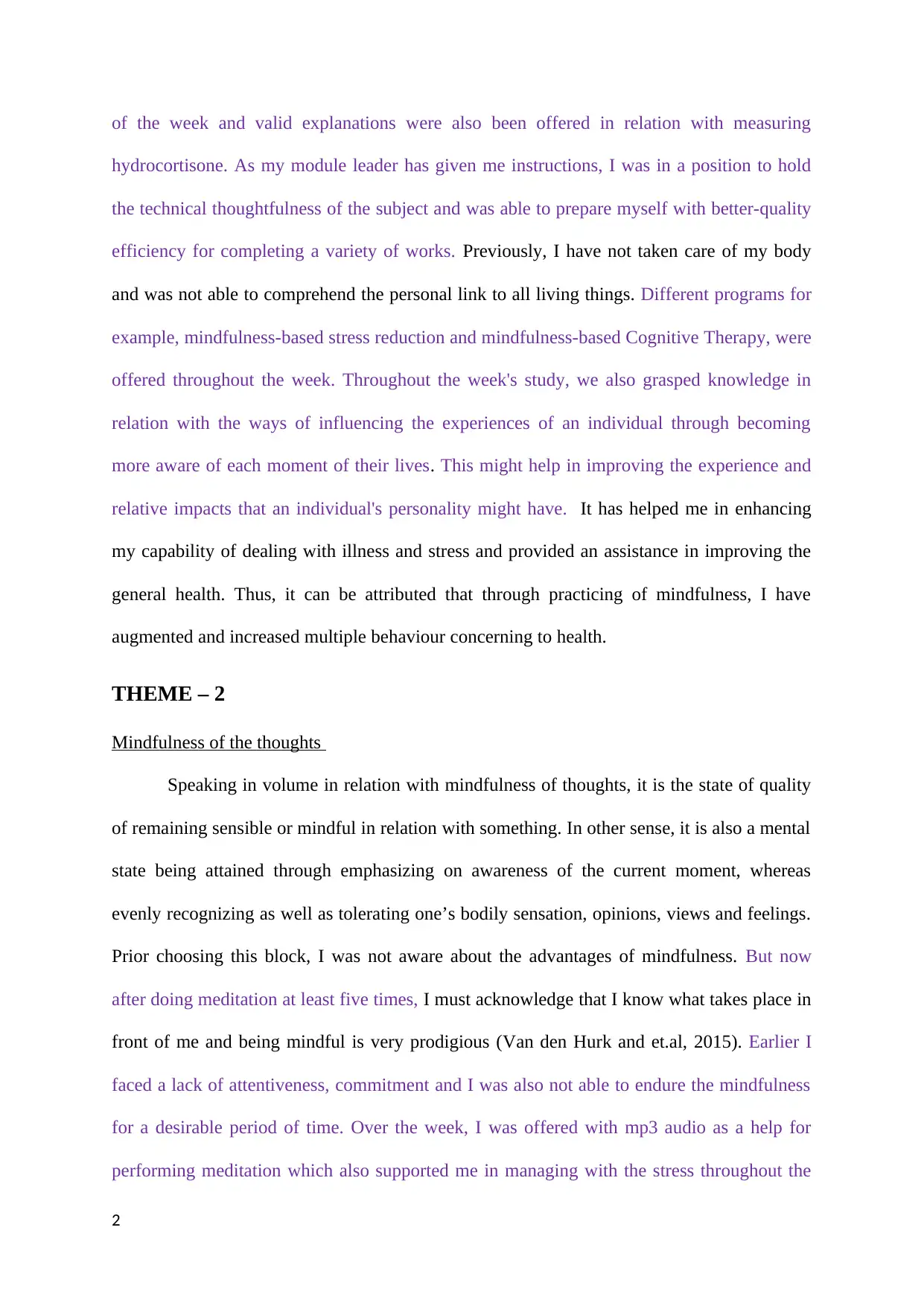
of the week and valid explanations were also been offered in relation with measuring
hydrocortisone. As my module leader has given me instructions, I was in a position to hold
the technical thoughtfulness of the subject and was able to prepare myself with better-quality
efficiency for completing a variety of works. Previously, I have not taken care of my body
and was not able to comprehend the personal link to all living things. Different programs for
example, mindfulness-based stress reduction and mindfulness-based Cognitive Therapy, were
offered throughout the week. Throughout the week's study, we also grasped knowledge in
relation with the ways of influencing the experiences of an individual through becoming
more aware of each moment of their lives. This might help in improving the experience and
relative impacts that an individual's personality might have. It has helped me in enhancing
my capability of dealing with illness and stress and provided an assistance in improving the
general health. Thus, it can be attributed that through practicing of mindfulness, I have
augmented and increased multiple behaviour concerning to health.
THEME – 2
Mindfulness of the thoughts
Speaking in volume in relation with mindfulness of thoughts, it is the state of quality
of remaining sensible or mindful in relation with something. In other sense, it is also a mental
state being attained through emphasizing on awareness of the current moment, whereas
evenly recognizing as well as tolerating one’s bodily sensation, opinions, views and feelings.
Prior choosing this block, I was not aware about the advantages of mindfulness. But now
after doing meditation at least five times, I must acknowledge that I know what takes place in
front of me and being mindful is very prodigious (Van den Hurk and et.al, 2015). Earlier I
faced a lack of attentiveness, commitment and I was also not able to endure the mindfulness
for a desirable period of time. Over the week, I was offered with mp3 audio as a help for
performing meditation which also supported me in managing with the stress throughout the
2
hydrocortisone. As my module leader has given me instructions, I was in a position to hold
the technical thoughtfulness of the subject and was able to prepare myself with better-quality
efficiency for completing a variety of works. Previously, I have not taken care of my body
and was not able to comprehend the personal link to all living things. Different programs for
example, mindfulness-based stress reduction and mindfulness-based Cognitive Therapy, were
offered throughout the week. Throughout the week's study, we also grasped knowledge in
relation with the ways of influencing the experiences of an individual through becoming
more aware of each moment of their lives. This might help in improving the experience and
relative impacts that an individual's personality might have. It has helped me in enhancing
my capability of dealing with illness and stress and provided an assistance in improving the
general health. Thus, it can be attributed that through practicing of mindfulness, I have
augmented and increased multiple behaviour concerning to health.
THEME – 2
Mindfulness of the thoughts
Speaking in volume in relation with mindfulness of thoughts, it is the state of quality
of remaining sensible or mindful in relation with something. In other sense, it is also a mental
state being attained through emphasizing on awareness of the current moment, whereas
evenly recognizing as well as tolerating one’s bodily sensation, opinions, views and feelings.
Prior choosing this block, I was not aware about the advantages of mindfulness. But now
after doing meditation at least five times, I must acknowledge that I know what takes place in
front of me and being mindful is very prodigious (Van den Hurk and et.al, 2015). Earlier I
faced a lack of attentiveness, commitment and I was also not able to endure the mindfulness
for a desirable period of time. Over the week, I was offered with mp3 audio as a help for
performing meditation which also supported me in managing with the stress throughout the
2
⊘ This is a preview!⊘
Do you want full access?
Subscribe today to unlock all pages.

Trusted by 1+ million students worldwide
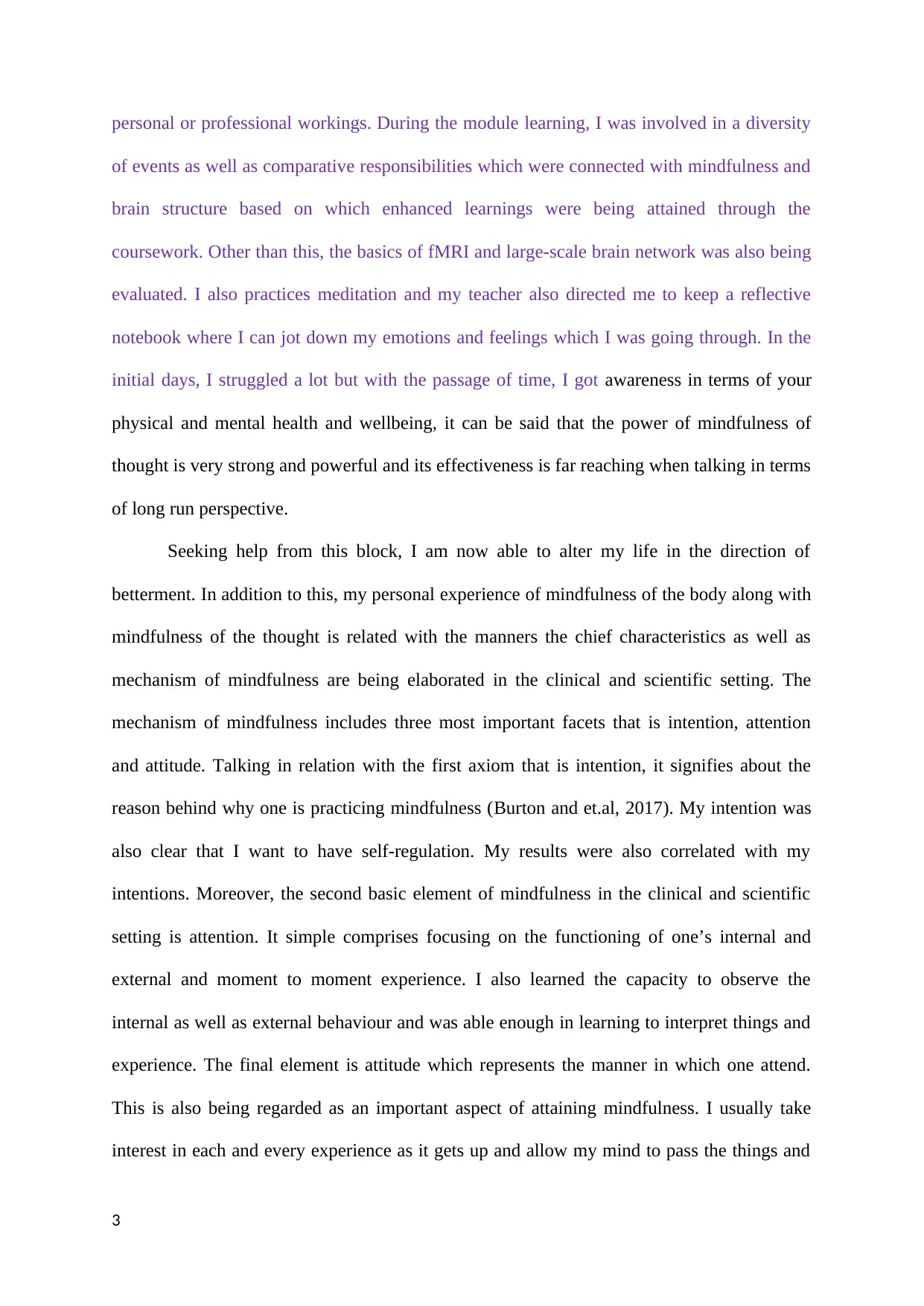
personal or professional workings. During the module learning, I was involved in a diversity
of events as well as comparative responsibilities which were connected with mindfulness and
brain structure based on which enhanced learnings were being attained through the
coursework. Other than this, the basics of fMRI and large-scale brain network was also being
evaluated. I also practices meditation and my teacher also directed me to keep a reflective
notebook where I can jot down my emotions and feelings which I was going through. In the
initial days, I struggled a lot but with the passage of time, I got awareness in terms of your
physical and mental health and wellbeing, it can be said that the power of mindfulness of
thought is very strong and powerful and its effectiveness is far reaching when talking in terms
of long run perspective.
Seeking help from this block, I am now able to alter my life in the direction of
betterment. In addition to this, my personal experience of mindfulness of the body along with
mindfulness of the thought is related with the manners the chief characteristics as well as
mechanism of mindfulness are being elaborated in the clinical and scientific setting. The
mechanism of mindfulness includes three most important facets that is intention, attention
and attitude. Talking in relation with the first axiom that is intention, it signifies about the
reason behind why one is practicing mindfulness (Burton and et.al, 2017). My intention was
also clear that I want to have self-regulation. My results were also correlated with my
intentions. Moreover, the second basic element of mindfulness in the clinical and scientific
setting is attention. It simple comprises focusing on the functioning of one’s internal and
external and moment to moment experience. I also learned the capacity to observe the
internal as well as external behaviour and was able enough in learning to interpret things and
experience. The final element is attitude which represents the manner in which one attend.
This is also being regarded as an important aspect of attaining mindfulness. I usually take
interest in each and every experience as it gets up and allow my mind to pass the things and
3
of events as well as comparative responsibilities which were connected with mindfulness and
brain structure based on which enhanced learnings were being attained through the
coursework. Other than this, the basics of fMRI and large-scale brain network was also being
evaluated. I also practices meditation and my teacher also directed me to keep a reflective
notebook where I can jot down my emotions and feelings which I was going through. In the
initial days, I struggled a lot but with the passage of time, I got awareness in terms of your
physical and mental health and wellbeing, it can be said that the power of mindfulness of
thought is very strong and powerful and its effectiveness is far reaching when talking in terms
of long run perspective.
Seeking help from this block, I am now able to alter my life in the direction of
betterment. In addition to this, my personal experience of mindfulness of the body along with
mindfulness of the thought is related with the manners the chief characteristics as well as
mechanism of mindfulness are being elaborated in the clinical and scientific setting. The
mechanism of mindfulness includes three most important facets that is intention, attention
and attitude. Talking in relation with the first axiom that is intention, it signifies about the
reason behind why one is practicing mindfulness (Burton and et.al, 2017). My intention was
also clear that I want to have self-regulation. My results were also correlated with my
intentions. Moreover, the second basic element of mindfulness in the clinical and scientific
setting is attention. It simple comprises focusing on the functioning of one’s internal and
external and moment to moment experience. I also learned the capacity to observe the
internal as well as external behaviour and was able enough in learning to interpret things and
experience. The final element is attitude which represents the manner in which one attend.
This is also being regarded as an important aspect of attaining mindfulness. I usually take
interest in each and every experience as it gets up and allow my mind to pass the things and
3
Paraphrase This Document
Need a fresh take? Get an instant paraphrase of this document with our AI Paraphraser
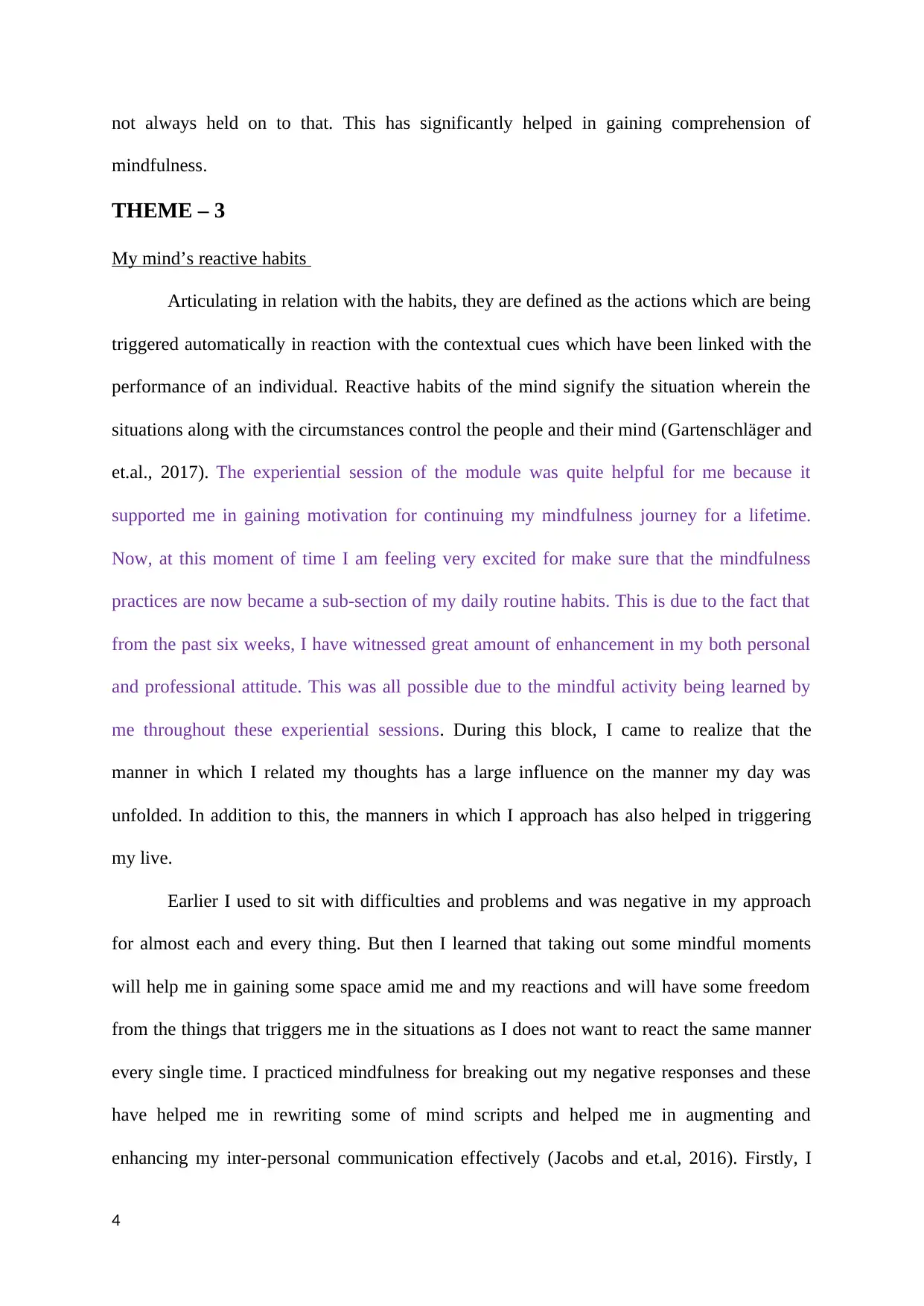
not always held on to that. This has significantly helped in gaining comprehension of
mindfulness.
THEME – 3
My mind’s reactive habits
Articulating in relation with the habits, they are defined as the actions which are being
triggered automatically in reaction with the contextual cues which have been linked with the
performance of an individual. Reactive habits of the mind signify the situation wherein the
situations along with the circumstances control the people and their mind (Gartenschläger and
et.al., 2017). The experiential session of the module was quite helpful for me because it
supported me in gaining motivation for continuing my mindfulness journey for a lifetime.
Now, at this moment of time I am feeling very excited for make sure that the mindfulness
practices are now became a sub-section of my daily routine habits. This is due to the fact that
from the past six weeks, I have witnessed great amount of enhancement in my both personal
and professional attitude. This was all possible due to the mindful activity being learned by
me throughout these experiential sessions. During this block, I came to realize that the
manner in which I related my thoughts has a large influence on the manner my day was
unfolded. In addition to this, the manners in which I approach has also helped in triggering
my live.
Earlier I used to sit with difficulties and problems and was negative in my approach
for almost each and every thing. But then I learned that taking out some mindful moments
will help me in gaining some space amid me and my reactions and will have some freedom
from the things that triggers me in the situations as I does not want to react the same manner
every single time. I practiced mindfulness for breaking out my negative responses and these
have helped me in rewriting some of mind scripts and helped me in augmenting and
enhancing my inter-personal communication effectively (Jacobs and et.al, 2016). Firstly, I
4
mindfulness.
THEME – 3
My mind’s reactive habits
Articulating in relation with the habits, they are defined as the actions which are being
triggered automatically in reaction with the contextual cues which have been linked with the
performance of an individual. Reactive habits of the mind signify the situation wherein the
situations along with the circumstances control the people and their mind (Gartenschläger and
et.al., 2017). The experiential session of the module was quite helpful for me because it
supported me in gaining motivation for continuing my mindfulness journey for a lifetime.
Now, at this moment of time I am feeling very excited for make sure that the mindfulness
practices are now became a sub-section of my daily routine habits. This is due to the fact that
from the past six weeks, I have witnessed great amount of enhancement in my both personal
and professional attitude. This was all possible due to the mindful activity being learned by
me throughout these experiential sessions. During this block, I came to realize that the
manner in which I related my thoughts has a large influence on the manner my day was
unfolded. In addition to this, the manners in which I approach has also helped in triggering
my live.
Earlier I used to sit with difficulties and problems and was negative in my approach
for almost each and every thing. But then I learned that taking out some mindful moments
will help me in gaining some space amid me and my reactions and will have some freedom
from the things that triggers me in the situations as I does not want to react the same manner
every single time. I practiced mindfulness for breaking out my negative responses and these
have helped me in rewriting some of mind scripts and helped me in augmenting and
enhancing my inter-personal communication effectively (Jacobs and et.al, 2016). Firstly, I
4
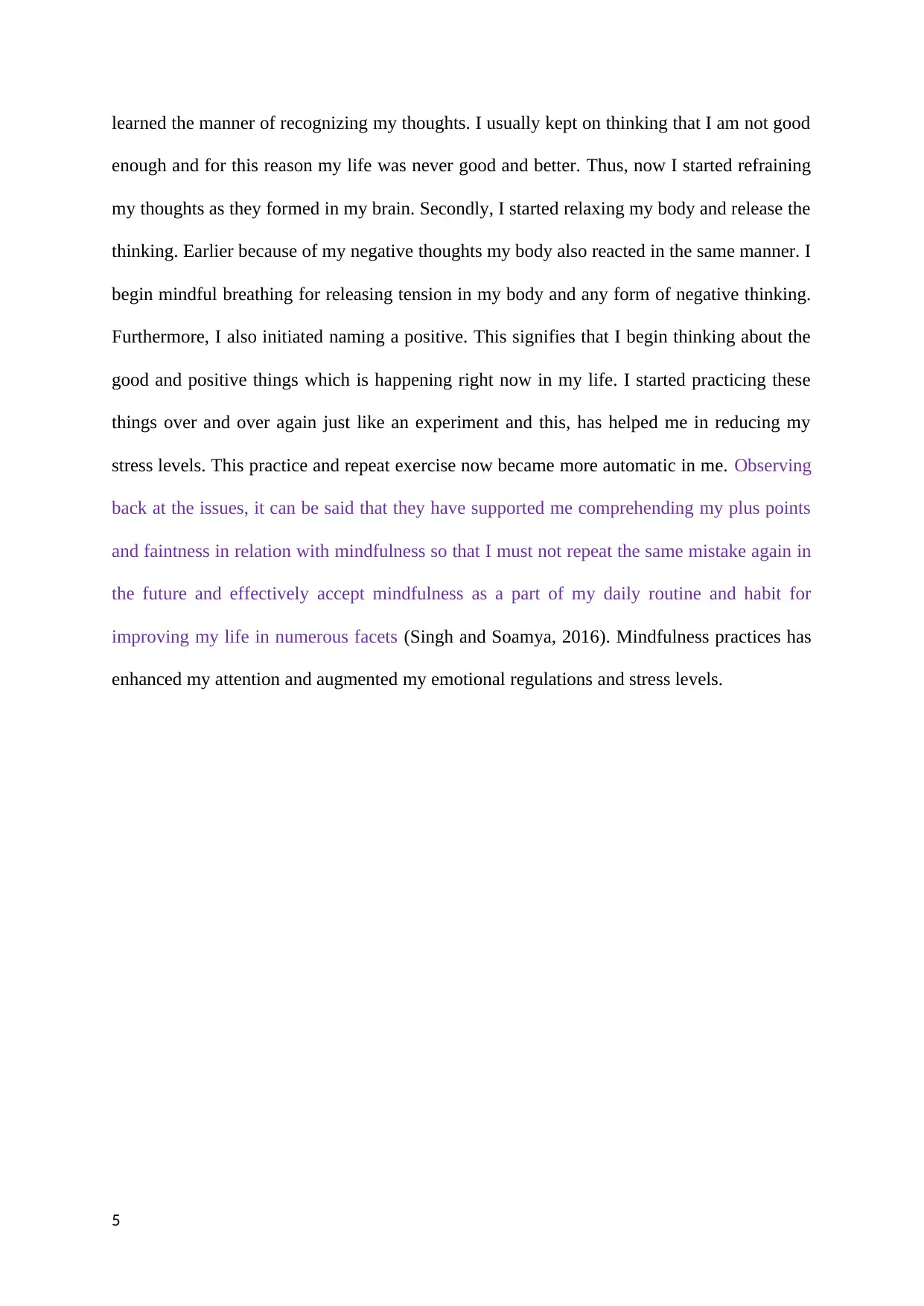
learned the manner of recognizing my thoughts. I usually kept on thinking that I am not good
enough and for this reason my life was never good and better. Thus, now I started refraining
my thoughts as they formed in my brain. Secondly, I started relaxing my body and release the
thinking. Earlier because of my negative thoughts my body also reacted in the same manner. I
begin mindful breathing for releasing tension in my body and any form of negative thinking.
Furthermore, I also initiated naming a positive. This signifies that I begin thinking about the
good and positive things which is happening right now in my life. I started practicing these
things over and over again just like an experiment and this, has helped me in reducing my
stress levels. This practice and repeat exercise now became more automatic in me. Observing
back at the issues, it can be said that they have supported me comprehending my plus points
and faintness in relation with mindfulness so that I must not repeat the same mistake again in
the future and effectively accept mindfulness as a part of my daily routine and habit for
improving my life in numerous facets (Singh and Soamya, 2016). Mindfulness practices has
enhanced my attention and augmented my emotional regulations and stress levels.
5
enough and for this reason my life was never good and better. Thus, now I started refraining
my thoughts as they formed in my brain. Secondly, I started relaxing my body and release the
thinking. Earlier because of my negative thoughts my body also reacted in the same manner. I
begin mindful breathing for releasing tension in my body and any form of negative thinking.
Furthermore, I also initiated naming a positive. This signifies that I begin thinking about the
good and positive things which is happening right now in my life. I started practicing these
things over and over again just like an experiment and this, has helped me in reducing my
stress levels. This practice and repeat exercise now became more automatic in me. Observing
back at the issues, it can be said that they have supported me comprehending my plus points
and faintness in relation with mindfulness so that I must not repeat the same mistake again in
the future and effectively accept mindfulness as a part of my daily routine and habit for
improving my life in numerous facets (Singh and Soamya, 2016). Mindfulness practices has
enhanced my attention and augmented my emotional regulations and stress levels.
5
⊘ This is a preview!⊘
Do you want full access?
Subscribe today to unlock all pages.

Trusted by 1+ million students worldwide
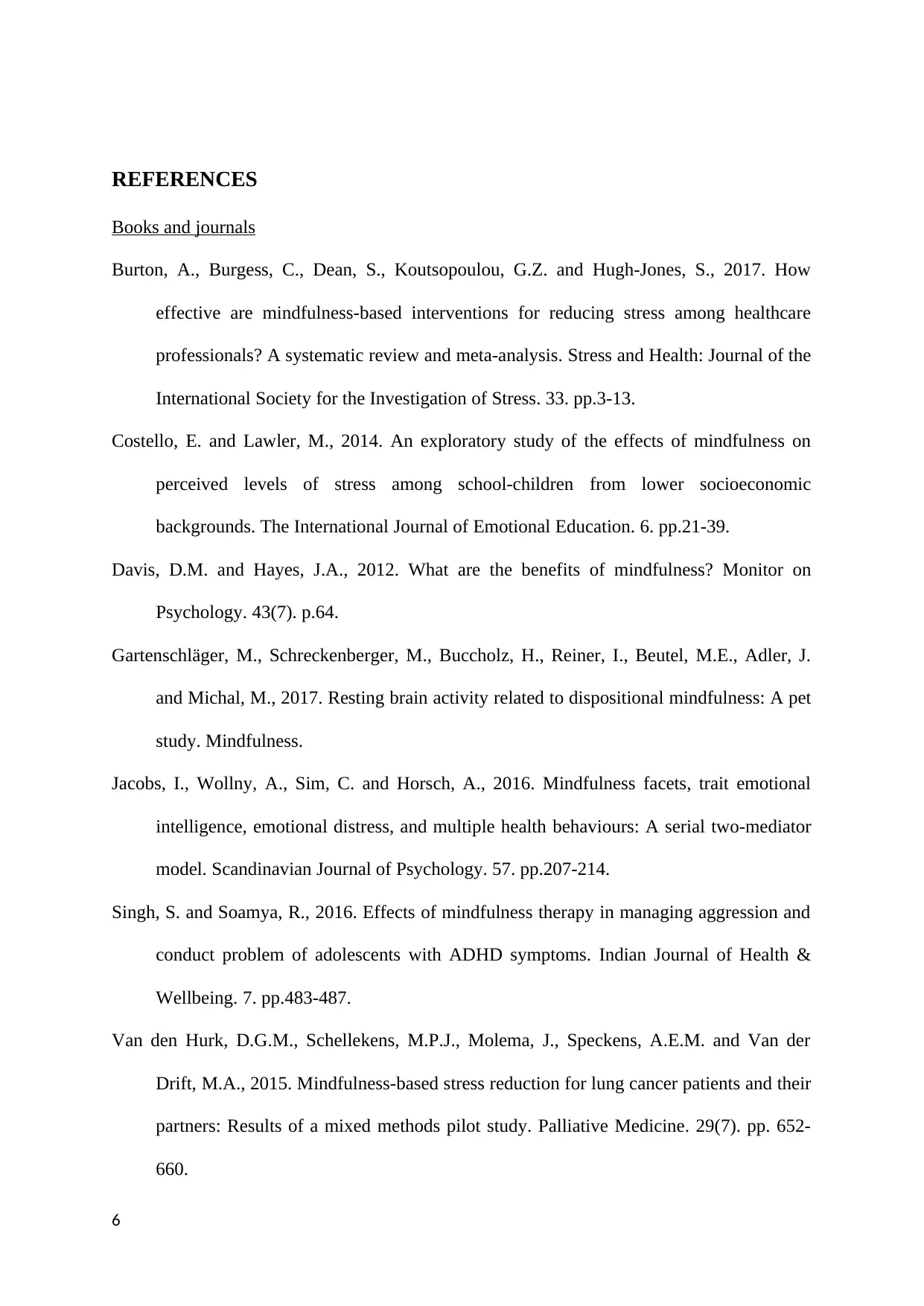
REFERENCES
Books and journals
Burton, A., Burgess, C., Dean, S., Koutsopoulou, G.Z. and Hugh-Jones, S., 2017. How
effective are mindfulness-based interventions for reducing stress among healthcare
professionals? A systematic review and meta‐analysis. Stress and Health: Journal of the
International Society for the Investigation of Stress. 33. pp.3-13.
Costello, E. and Lawler, M., 2014. An exploratory study of the effects of mindfulness on
perceived levels of stress among school-children from lower socioeconomic
backgrounds. The International Journal of Emotional Education. 6. pp.21-39.
Davis, D.M. and Hayes, J.A., 2012. What are the benefits of mindfulness? Monitor on
Psychology. 43(7). p.64.
Gartenschläger, M., Schreckenberger, M., Buccholz, H., Reiner, I., Beutel, M.E., Adler, J.
and Michal, M., 2017. Resting brain activity related to dispositional mindfulness: A pet
study. Mindfulness.
Jacobs, I., Wollny, A., Sim, C. and Horsch, A., 2016. Mindfulness facets, trait emotional
intelligence, emotional distress, and multiple health behaviours: A serial two‐mediator
model. Scandinavian Journal of Psychology. 57. pp.207-214.
Singh, S. and Soamya, R., 2016. Effects of mindfulness therapy in managing aggression and
conduct problem of adolescents with ADHD symptoms. Indian Journal of Health &
Wellbeing. 7. pp.483-487.
Van den Hurk, D.G.M., Schellekens, M.P.J., Molema, J., Speckens, A.E.M. and Van der
Drift, M.A., 2015. Mindfulness-based stress reduction for lung cancer patients and their
partners: Results of a mixed methods pilot study. Palliative Medicine. 29(7). pp. 652-
660.
6
Books and journals
Burton, A., Burgess, C., Dean, S., Koutsopoulou, G.Z. and Hugh-Jones, S., 2017. How
effective are mindfulness-based interventions for reducing stress among healthcare
professionals? A systematic review and meta‐analysis. Stress and Health: Journal of the
International Society for the Investigation of Stress. 33. pp.3-13.
Costello, E. and Lawler, M., 2014. An exploratory study of the effects of mindfulness on
perceived levels of stress among school-children from lower socioeconomic
backgrounds. The International Journal of Emotional Education. 6. pp.21-39.
Davis, D.M. and Hayes, J.A., 2012. What are the benefits of mindfulness? Monitor on
Psychology. 43(7). p.64.
Gartenschläger, M., Schreckenberger, M., Buccholz, H., Reiner, I., Beutel, M.E., Adler, J.
and Michal, M., 2017. Resting brain activity related to dispositional mindfulness: A pet
study. Mindfulness.
Jacobs, I., Wollny, A., Sim, C. and Horsch, A., 2016. Mindfulness facets, trait emotional
intelligence, emotional distress, and multiple health behaviours: A serial two‐mediator
model. Scandinavian Journal of Psychology. 57. pp.207-214.
Singh, S. and Soamya, R., 2016. Effects of mindfulness therapy in managing aggression and
conduct problem of adolescents with ADHD symptoms. Indian Journal of Health &
Wellbeing. 7. pp.483-487.
Van den Hurk, D.G.M., Schellekens, M.P.J., Molema, J., Speckens, A.E.M. and Van der
Drift, M.A., 2015. Mindfulness-based stress reduction for lung cancer patients and their
partners: Results of a mixed methods pilot study. Palliative Medicine. 29(7). pp. 652-
660.
6
Paraphrase This Document
Need a fresh take? Get an instant paraphrase of this document with our AI Paraphraser

7
1 out of 8
Related Documents
Your All-in-One AI-Powered Toolkit for Academic Success.
+13062052269
info@desklib.com
Available 24*7 on WhatsApp / Email
![[object Object]](/_next/static/media/star-bottom.7253800d.svg)
Unlock your academic potential
Copyright © 2020–2026 A2Z Services. All Rights Reserved. Developed and managed by ZUCOL.




